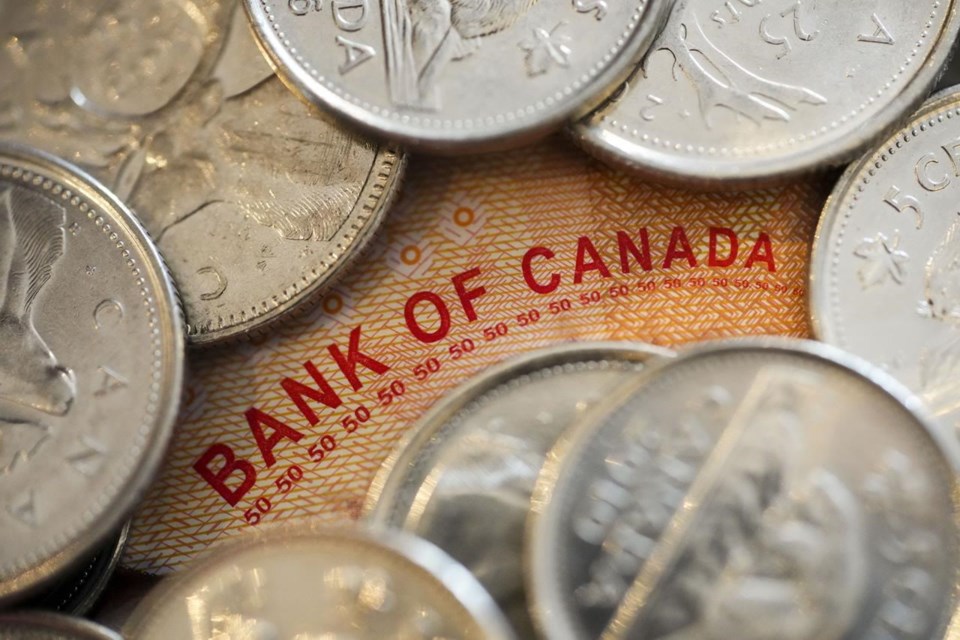OTTAWA — The Bank of Canada held its key interest rate steady at five per cent on Wednesday, but hasn't ruled out future rate hikes as its latest projections show inflation remaining higher in the short term.
"With clearer evidence that monetary policy is working, governing council's collective judgment was that we could be patient and hold the policy rate at five per cent. We will continue with that to assess whether monetary policy is sufficiently restrictive, to restore price stability, and we will monitor risks closely," Governor Tiff Macklem said in a news conference.
"If inflationary pressures persist, we are prepared to raise our policy rate further to restore price stability," he warned.
Higher interest rates appear to be having their intended effect on the economy: growth is stalling, consumer spending is slowing and the job market is softening.
Meanwhile, inflation resumed its decline in September, falling to 3.8 per cent as price pressures eased across the economy.
BMO chief economist Douglas Porter said although he doesn't expect the central bank will need to raise interest rates again, it is too soon to rule out the possibility.
"I do think they have a bias to hike rates again, if need be," Porter said. "It probably wouldn't take that much to get them to hike rates."
The Bank of Canada's hawkish tone was anticipated by economists, given underlying price pressures have remained stubbornly high.
"Although the BoC has painted a clear picture for why it doesn't need to hike again, we expect its hawkish rhetoric to persist," said TD director of economics, James Orlando, in a client note.
That's because it needs to maintain tight financial conditions to ensure both growth and inflation continue along the Bank of Canada's projected trajectory, he added.
The central bank published its quarterly monetary policy report on Wednesday, which includes new economic forecasts that suggest slower economic growth and higher inflation in the short-run.
Real gross domestic product is projected to grow 1.2 per cent in 2023, down from 1.8 per cent in its previous forecast.
Meanwhile, growth is expected to come in weaker in 2024 — with real GDP rising by 0.9 per cent — and to rebound to 2.5 per cent in 2025.
The central bank still believes inflation will return to the two per cent target in 2025, as previously forecast. However, it anticipates inflation to be higher in the short term, averaging about 3.5 per cent through the middle of 2024.
Macklem said the new forecasts suggest the path toward a "soft landing" — getting inflation down to two per cent without a sharp economic downturn — has narrowed.
"We've been saying for some time, the path to a soft landing is narrow. And in this projection, that path has gotten narrower," the governor said.
When asked whether this period of lower growth and high inflation would qualify as stagflation, Macklem said "it's not a word I would use."
"I grew up in the 1970s. Stagflation to me is a period of high inflation and high unemployment. That's not what we're in now," Macklem said, adding that the unemployment rate is still quite low.
Looking ahead, the monetary policy report outlines some risks surrounding its forecasts, including the war between Israel and Hamas. With oil prices right now higher than previously expected, the central bank says an escalation of the war into a broader regional conflict could disrupt global oil supplies.
Macklem also weighed in on the impact government spending is having on inflation, noting that federal and provincial budgets in aggregate will add to inflation over the next year.
"If all those spending plans are realized, government spending will be adding to demand more than supply is growing. And in an environment where we're trying to moderate spending and get inflation down, that's not helpful," Macklem said.
"It would be helpful if governments considered the inflationary impact of their spending decisions when they're making their spending plans. It's going to be easier to get inflation down if monetary and fiscal policy are rowing in the same direction."
This report by The Canadian Press was first published Oct. 25, 2023.
Nojoud Al Mallees, The Canadian Press



